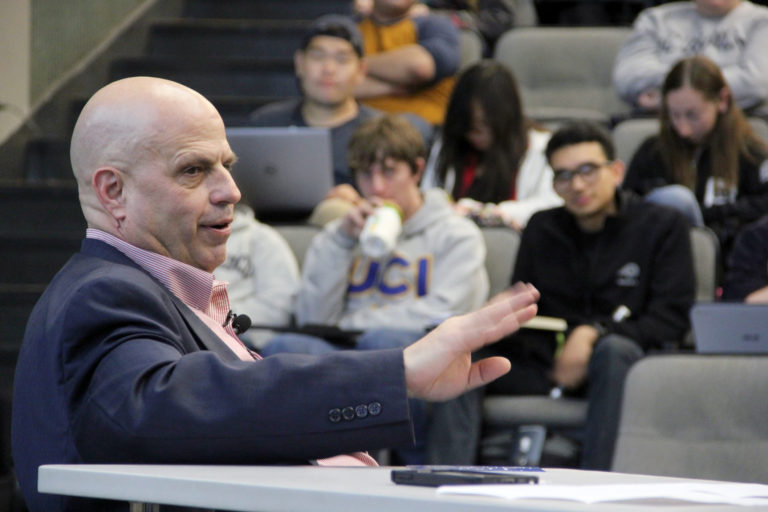$5 Million Gift from ICS Alumnus Establishes UCI’s Steckler Center for Responsible, Ethical, and Accessible Technology (CREATe)
From healthcare to criminal justice, there are countless examples of the impact of AI — and of the human bias that can be carried within it. “Over the last decade, we have seen the absolute destruction AI can wreak on the world as well as the gifts it can bestow,” says Gillian Hayes, vice provost for graduate education and dean of the Graduate Division at UCI. So how might we reconfigure technological processes and infrastructures to center justice and promote human rights and social values? This is just one of the many questions that the new Steckler Center for Responsible, Ethical and Accessible Technology (CREATe), housed in UCI’s Donald Bren School of Information & Computer Sciences (ICS), aims to address.

The center was made possible through a generous gift from Vincent Steckler, who graduated from UCI in 1980 with a B.S. in information and computer science and a B.S. in mathematics. Steckler and his wife, Amanda, recently gifted $10.4 million to UCI, half of which is supporting art history students while the other half helped establish CREATe.
“I believe that the Center for Responsible, Ethical and Accessible Technologies could dramatically change some of the toxic tendencies within Silicon Valley,” says Steckler. “And if we change the way Silicon Valley operates, we can change the world.”
Hayes, who is also the Robert A. and Barbara L. Kleist Professor of Informatics, worked closely with the Stecklers on the CREATe proposal. “When we first began discussing this opportunity last year, it was clear from the start that they saw the way that UCI was poised to step out in front and change the culture of the entire industry while preparing our students for the new world they are entering,” she says. “Machines do as they are trained, and the CREATe center has the opportunity to train them to do good.”

The center is fostering multidisciplinary projects between faculty and graduate students from ICS and researchers from law, anthropology, media studies, sociology, philosophy, political science and economics. “The problems are larger than just ICS,” explains Paul Dourish, a Chancellor’s Professor in the Department of Informatics who is serving as the center’s director. “If we want to tackle questions of how data technologies shape people’s experience in domains like criminal justice and public services, we need strong interdisciplinary partnerships, and CREATe will establish an environment to do just that.”
Dourish views the center as an opportunity to amplify and build on previous efforts, pointing to the long history of work ICS has done in this area. “Going back to the founding of the department in the late ’60s, there has always been a focus on the social consequences of digitalization,” he says. He explains that Ph.D. fellowships offered through CREATe will provide the stability needed to expand the reach of projects started with grant funding. “This lets us build sustainable relationships, and I think that’s going to be incredibly important,” he says.
Furthermore, the center is working on collaborations that extend beyond campus and academia. “The way that we have to do this work is by partnering with community organizations, with civil society organizations and with others outside the university in order to achieve lasting change,” says Dourish. At the same time, by emphasizing diversity, inclusion and accessibility, the center will ensure that technology is built both by and for people from diverse backgrounds.
As outlined on the CREATe website, the vision is to “produce positive change in the world, focused on principles of equity, accountability and care.”
“I am grateful to Vincent and Amanda for their vision and generosity,” said Marios Papaefthymiou, dean of the School of ICS. “Their transformative gift propels our school to the vanguard of research and educational institutions around the globe that promote fairness and inclusiveness in the information-driven societies of the future.”
— Shani Murray